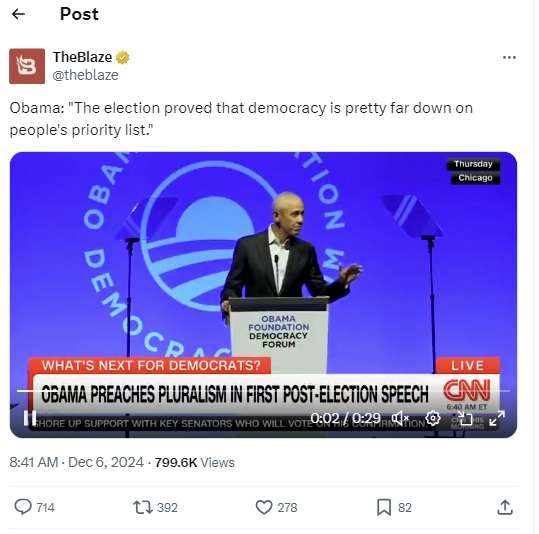The Volokh Conspiracy
Mostly law professors | Sometimes contrarian | Often libertarian | Always independent
Did President Obama Say "the Election Proved that Democracy Is Pretty Far Down on People's Priority List"
From a recent Tweet:
But actually, here's what he says (or you can read the very similar version in Obama's Medium post):
I should tell you that when I mentioned to a few friends that our foundation would be hosting a forum on democracy and pluralism, I got more than a few groans and eye-rolls. And it's understandable; after all, here in the United States we have just been through a fierce, hard-fought election, and it's fair to say that it did not turn out as they hoped. And for them, talk of bridging our differences when the country and the world seem so bitterly divided felt like an academic exercise. It felt far-fetched, even naïve, especially since, as far as they were concerned, the election proved that democracy is pretty far down on people's priority list. And I understood their skepticism; maybe you had a conversation with a friend that felt the same way. But as a citizen and part of a foundation that believes deeply in the promise of democracy—not only to recognize the dignity and the worth of every individual, but to produce freer, and fairer, and more just societies—I can't think of a better time to talk about it.
Obama is characterizing what some people believe ("as far as they were concerned"), not stating it as his own message. Indeed, he's expressing some disagreement with those people, at least as to the value of discussing democracy now. Perhaps some might suspect that he actually does agree that "democracy is pretty far down on people's priority interest." But quoting that phrase without Obama's "as far as they were concerned" strikes me as not quite right.
Here, by the way, is another passage from the speech that I'm glad Obama included, and that I think more people, on the Left, Right, and otherwise should bear in mind:
[T]he concept of pluralism should, and is actually familiar to all of us. It means that in a democracy, we all have to find a way to live alongside individuals and groups who are different than us. So we commit to a system of rules and habits that help us peacefully resolve our disputes; we try to cultivate habits — those practices that encourage us not just to tolerate each other but also — every so often — join together in collective action. The pluralist ideal is what allows a Christian church and Muslim mosque to sit side by side on the same city block — and then maybe agree to share a parking lot. It's what keeps you from pulling down a sign in your neighbor's yard supporting a cause you find completely irritating, and it keeps him from doing the same to you; it's what encourages you to team up with a co-worker on a project and get the job done despite the fact that the two of you disagree on abortion, gun ownership, and the merits of Taylor Swift versus Beyoncé.
I read the rest of the speech, and there are of course parts that I didn't agree with. But on balance I think it teaches a pretty healthy attitude towards democracy and dealing with people who disagree with you.



Show Comments (345)